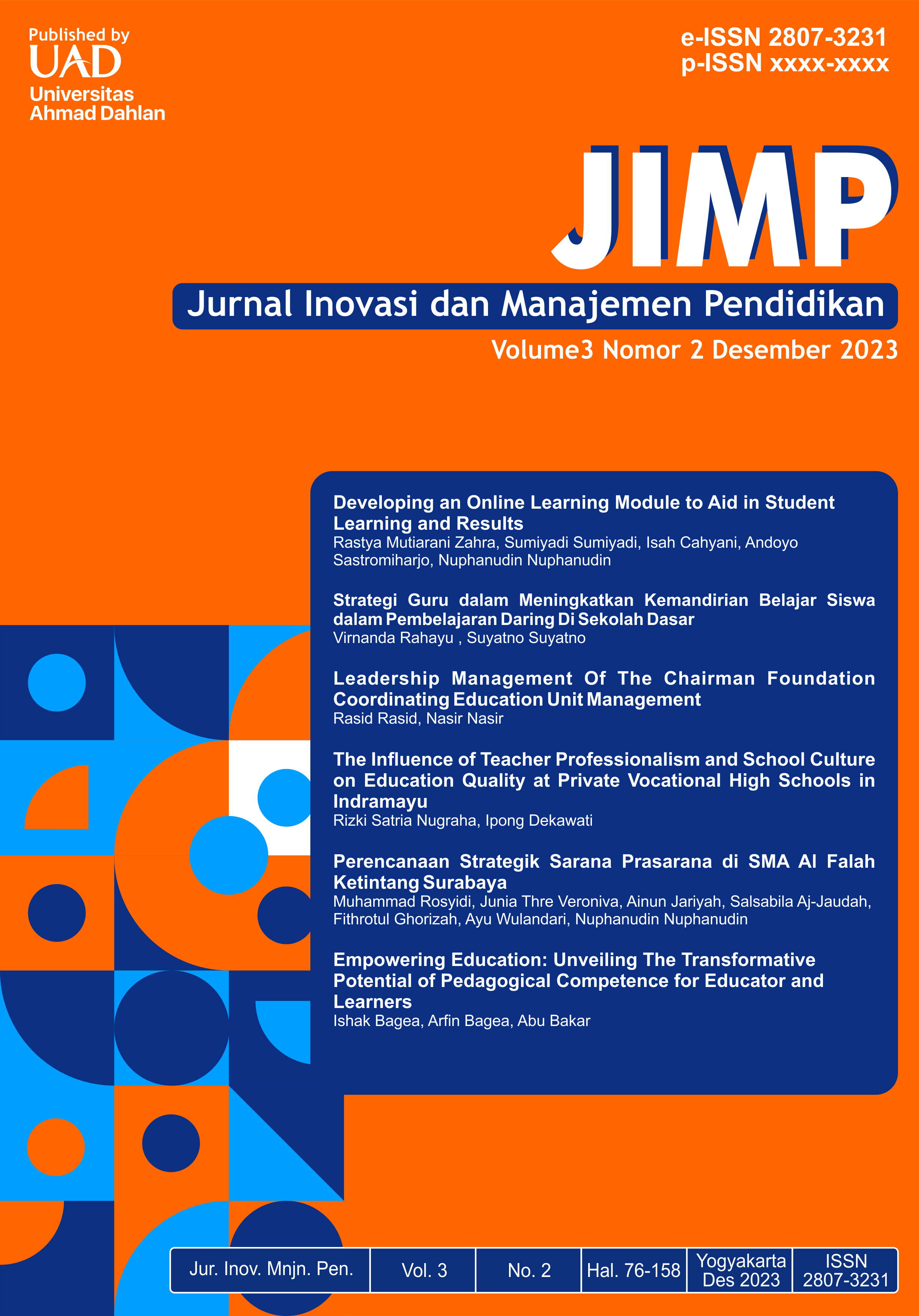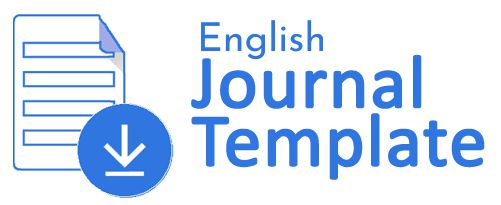The Influence of Teacher Professionalism and School Culture on Education Quality at Private Vocational High Schools in Indramayu
DOI:
https://doi.org/10.12928/jimp.v3i2.9374Keywords:
Education quality, School culture, Teacher professionalismAbstract
Education is essential in enhancing life quality. It fosters societal benefits and prosperity. The necessity of education extends its significance to individuals, societies, and even nations. Multiple elements contribute to enhancing education quality, encompassing teacher professionalism and school culture. Hence, this study assesses the impact of teacher professionalism and school culture on education quality, individually and collectively. The research utilizes a descriptive and verificative methodology, employing Likert scale questionnaires to gather data from 59 teachers. Regression analysis techniques process the data, and significance is assessed via F-tests. The findings indicate: (1) Teacher professionalism significantly and positively affects education quality; (2) School culture similarly exerts a positive and significant influence; (3) Simultaneously, teacher professionalism and school culture significantly enhance education quality. In light of these outcomes, the author proposes (1) Enhancing teacher professionalism through self-growth, academic participation, and adherence to ethical standards, further enriched by engaging in educational activities and community collaborations facilitated by school committees. (2) For improved education quality, emphasize the underrepresented dimension of norms within school culture, integrate various educational norms into school life and social interactions, and foster alignment with internal school policies and government regulations
References
Akilovna, E. M. (2022). METHODS OF PROFESSIONAL COMPETENCE DEVELOPMENT OF PEDAGOGUES. INTERNATIONAL JOURNAL OF SOCIAL SCIENCE & INTERDISCIPLINARY RESEARCH ISSN: 2277-3630 Impact Factor: 7.429, 11(05), 228–232.
Clifton, J., Thompson, S., & Thorley, C. (2014). Winning the Global Race?: Jobs, Skills and the Importance of Vocational Education. IPPR London.
Combs, C. D. (2013). Thoughts about the Future of Modeling and Simulation in Healthcare and Higher Education. Biomedical Engineering, 2(2), 115–121.
Danim, S. (2016). Inovasi pendidikan: dalam upaya peningkatan profesionalisme tenaga kependidikan.
Deal, T. E., & Peterson, K. D. (2016). Shaping school culture. John Wiley & Sons.
Dekawati, I., Suhendar, D., & Aji, A. I. (2019). Organizational Behavior and Work Disciplines (Their Effect on Work Achievement).
Dewi, R., & Khotimah, S. H. (2020). Pengaruh Profesionalisme Dan Disiplin Kerja Guru Terhadap Peningkatan Mutu Pendidikan Di Sekolah Dasar. ELEMENTARY: Islamic Teacher Journal, 8(2), 279.
Fattah, N. (2013). Analisis kebijakan pendidikan.
Gaspertz, V. (1991). Metode Perancangan Percobaan. Bandung: Armico.
Glanz, J. (2014). Action research: An educational leader’s guide to school improvement. Rowman & Littlefield.
Harahap, H. A. H., & Poerbakawatja, R. S. (1981). Ensiklopedi Pendidikan. PT. Gunung Agung, Jakarta.
Luthans, F., Luthans, B. C., & Luthans, K. W. (2021). Organizational behavior: An evidence-based approach fourteenth edition. IAP.
Marhawati, B. (2020). Pelaksanaan Supervisi Akademik Kepala Sekolah Dasar: Studi Kualitatif. JMSP (Jurnal Manajemen Dan Supervisi Pendidikan), 4(2), 71–76.
Mukhopadhyay, M. (2020). Total quality management in education. SAGE Publications Pvt. Limited.
Mustowiyah, M., & Sunanda, S. (2017). Pengaruh Budaya Sekolah dan Kompetensi Guru terhadap Mutu Pendidikan di SMP Negeri Se-Kecamatan Randudongkal Kabupaten Pemalang. JP3 (Jurnal Pendidikan Dan Profesi Pendidik), 3(1).
Núñez Pardo, A., & Téllez Téllez, M. F. (2015). Reflection on teachers’ personal and professional growth through a materials development seminar. How, 22(2), 54–74.
Sallis, E. (2014). Total quality management in education. Routledge.
Schein, E. H. (2010). Organizational culture and leadership (Vol. 2). John Wiley & Sons.
Suderadjat, H. (2005). Manajemen Peningkatan Mutu Berbasis Sekolah, Bandung: CV. Cipta Cekas Grafika.
Sukadari, S. (2020). Peranan Budaya Sekolah dalam Meningkatkan Mutu Pendidikan. Exponential (Education For Exceptional Children) Jurnal Pendidikan Luar Biasa, 1(1), 75–86.
Sumarsono, R. B., Gunawan, I., Kusumaningrum, D. E., Benty, D. D. N., & Bhayangkara, A. N. (2021). Influence of Lecturer’s Pedagogic Competency Level, Quality of Administrative Services, Completeness of Lecture Supporting Facilities, and Student Satisfaction on Learning Motivation. Jurnal Ilmu Pendidikan, 27(1), 23–33.
Suryana, A., & Komariah, A. (2019). Discipline enforcement through leadership and motivation Leadership in school changing View project Development of Value-Based Leadership: Model in Quality Culture Improvement on Primary Schools View project. https://www.researchgate.net/publication/335995756
Suwartini, E. A. (2017). Supervisi akademik kepala sekolah, profesionalisme guru dan mutu pendidikan. Jurnal Administrasi Pendidikan, 24(2).
Syafarina, L., Mulyasa, E., & Koswara, N. (2021). Strategi manajerial penguatan kepala sekolah dalam meningkatkan kinerja guru. Jurnal Educatio FKIP UNMA, 7(4), 2036–2043.
Usman, M. U. (2011). Menjadi guru profesional/Moh. Uzer Usman.
Vangrieken, K., Dochy, F., Raes, E., & Kyndt, E. (2015). Teacher collaboration: A systematic review. Educational Research Review, 15, 17–40.
Yanova, N. (2015). Assessment of satisfaction with the quality of education: customer satisfaction index. Procedia-Social and Behavioral Sciences, 182, 566–573.
Yusnita, Y., Eriyanti, F., Engkizar, E., Anwar, F., Putri, N. E., Arifin, Z., & Syafril, S. (2018). Professional education and training for teachers (PLPG) improves pedagogic competence and teacher performance. Tadris: Jurnal Keguruan Dan Ilmu Tarbiyah, 3(2), 123–130.
Downloads
Published
How to Cite
Issue
Section
License
Copyright (c) 2023 Rizki Satria Nugraha, Ipong Dekawati

This work is licensed under a Creative Commons Attribution-ShareAlike 4.0 International License.
This article's copyright is transferred to Universitas Ahmad Dahlan (UAD) if and when the item is accepted for publication. The undersigned hereby transfers any rights in and to the paper including without limitation all copyrights to UAD. The undersigned hereby represents and warrants that the article is original and that he/she is the author of the paper, except for material identified as to its source, with permission notices from the copyright owners where required. The undersigned represents that he/she has the power and authority to make and execute this assignment.
We declare that:
This paper has not been published in the same form elsewhere.
It will not be submitted anywhere else for publication before acceptance/rejection by this Journal.
Copyright permission is obtained for materials published elsewhere and which require this permission for reproduction.
Furthermore, I/We hereby transfer the unlimited rights of publication of the above-mentioned paper in whole to UAD. The copyright transfer covers the exclusive right to reproduce and distribute the article, including reprints, translations, photographic reproductions, microform, electronic form (offline, online), or any other reproductions of similar nature.
The corresponding author signs for and accepts responsibility for releasing this material on behalf of any co-authors. This agreement is to be signed by at least one of the authors who have obtained the co-author(s) assent where applicable. After submission of this agreement signed by the corresponding author, changes of authorship or in the order of the authors listed will not be accepted.
Retained Rights/Terms and Conditions
Authors retain all proprietary rights in any process, procedure, or article of manufacture described in the Work.
Authors may reproduce or authorize others to reproduce the Work or derivative works for the author's personal use or company use, provided that the source and the UAD copyright notice are indicated, the copies are not used in any way that implies UAD endorsement of a product or service of any employer, and the documents themselves are not offered for sale.
Although authors are permitted to re-use all or portions of the Work in other works, this does not include granting third-party requests for reprinting, republishing, or different types of re-use.







